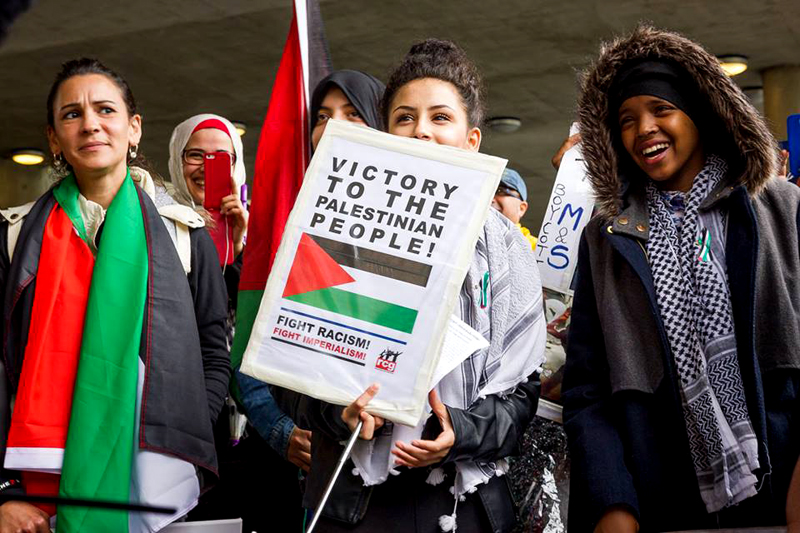Pro-Palestine protests attacked by Labour council and police
On 16 August on Market Street, Manchester, four protesters were violently arrested as they demonstrated against the genocidal attacks on Gaza, calling for an end to Britain’s links with the Israeli occupation. A day later, five more suffered the same fate while protesting outside Israeli cosmetics shop Kedem on King Street. There have been more arrests since, with police using their powers to ban protesters from the city centre and at least five people are being forced to appear in court on spurious Public Order Act charges.
This campaign of police harassment in Manchester is part of a premeditated political attack by Labour councillors, who are determined to stamp on the positive signs of real solidarity with the Palestinian people. It is vital that we resist these attacks.
The arrests came as protests rocked Manchester city centre for the fifth week running, including Saturday rolling pickets calling for a boycott of Israel, shutting down pro-Zionist corporations and banks including Barclays and Marks & Spencer.
FRFI has played a leading role in these protests which began on 12 July with a hundreds-strong open mic rally in Piccadilly Gardens. On the same day the Drive for Justice campaign organised a protest outside the BBC in Salford with over 5,000 demonstrators. On 19 July over 300 people invaded Barclays and M&S, setting up open mic sessions and also shutting down Tesco, H&M and Schuh. The campaign to shut down Kedem became a daily picket. These protests, which showed the effectiveness of a determined boycott movement, sent out a clear message to Israel’s supporters in Manchester: an end to ‘business as usual’.

This is the context to Manchester City Council’s political attack on pro-Palestine activists. From 26 July leading Labour councillor Pat Karney led a public smear campaign against the Saturday rolling pickets and the Kedem campaign in the Manchester Evening News. He joined council leader Sir Richard Leese in accusing the pro-Palestine protests of anti-Semitism – offering no proof whatsoever and perpetuating the myth that opposition to Israel means being anti-Jewish. Pat Karney also labelled demonstrators ‘extremists and revolutionaries’ and later organised his own Market Street ‘assembly’ to ‘defend shop workers’ from what he said was intimidation. Only seven people turned up, all managers and supervisors. His true concern for workers is shown in the fact that over 3,000 council workers have lost their jobs as a result of Labour’s obedience to the government’s cuts programme.
The Labour councillors’ ideological attack was accompanied by ’emergency meetings’ with senior figures in Greater Manchester Police. On 16 August, the day of the first arrests, legal observers identified uniformed officers from the Counter Terrorism and Domestic Extremism units, who were seen marking out ‘leading’ demonstrators, including FRFI supporters, and questioning others in the crowd about their position in organising the campaign. As hundreds marched down Market Street police pressured activists to limit their time to 10 minutes outside Barclays and other corporations. When this failed they tightened their cordon and became more aggressive towards the demonstrators. They blocked the crowd from picketing Marks & Spencer, forcing people to head in the opposite direction, back towards Piccadilly Gardens. Their plan had been to impose a Public Order Act section 14 notice, forcing the protest into a confined area and arresting anyone not complying. But as it became clear that they had not cordoned the gathering on all sides, they lashed out and arrested four targets in brutal fashion. Several police officers kneeled on the head and body of a Palestinian man they arrested. Another man was forced into a stress position against a window, while being shouted at to ‘stop resisting!’ A woman was arrested and forced to the ground. The crowd swelled as people joined to demand the release of the protesters.
The police officers then concocted stories to justify the arrests, including claims that they had feared for their own safety due to the behaviour of one peaceful demonstrator. They imposed bail conditions that would stop leading campaigners from joining protests against Israel’s horrific attacks on Gaza. This was the real aim of the police and the Labour council – to intimidate and destroy the rolling pickets and whichever Palestine solidarity activities represented a threat to ‘business as usual’. On 17 August councillor Daniel Gillard and other Labour politicians spoke on a Stop the War platform for ‘peace.’ On the same day, police arrested five Palestine supporters outside Kedem. A week earlier Gillard had appeared alongside Pat Karney to attack the Market Street pickets. Of course they want peace – for the private corporate interests that profit from Israel’s occupation of Palestine.
The demonstrators facing charges now have court dates on 15 September and 2 January. Police will continue to try and impose conditions on protesters. They have served a section 14 notice on the Boycott Kedem campaign, limiting numbers to 15 people inside a police pen round the corner from the store and arresting anyone seen protesting outside of it.
A political defence campaign is being organised in support of all of those charged and to challenge all attempts by the council and police to restrict or ban pro-Palestine demonstrations. Fighting for the rights of Palestinians means fighting for our own rights as well.
Victory to Palestine!
Defend the right to protest!
Drop the charges!
Defend the right to demonstrate for Palestine!
Picket of Manchester Magistrates’ Court, Spinningfields, Manchester M60 1PR
9am, Monday 15 September.
For further details contact Manchester FRFI on 07519 427 093




